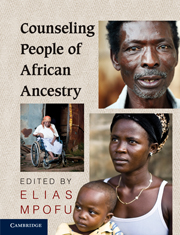Book contents
- Frontmatter
- Contents
- Contributors
- About the Editor
- Editorial Board
- Foreword
- Preface
- Acknowledgments
- PART 1 FOUNDATIONS OF COUNSELING IN AFRICAN SETTINGS
- 1 Indigenous Healing Practices in Sub-Saharan Africa
- 2 The Role of the Oral Tradition in Counseling People of African Ancestry
- 3 Assessment for Counseling Intervention
- 4 Research on Counseling in African Settings
- 5 Deconstructing Counseling Psychology for the African Context
- 6 Racial Oppression, Colonization, and Identity: Toward an Empowerment Model for People of African Heritage
- PART 2 CONTEXTS OF COUNSELING
- PART 3 COUNSELING APPLICATIONS
- PART 4 THE FUTURE OF COUNSELING IN AFRICAN HERITAGE SETTINGS
- Counseling People of African Ancestry Multiple Choice Answers
- Index
5 - Deconstructing Counseling Psychology for the African Context
Published online by Cambridge University Press: 05 August 2011
- Frontmatter
- Contents
- Contributors
- About the Editor
- Editorial Board
- Foreword
- Preface
- Acknowledgments
- PART 1 FOUNDATIONS OF COUNSELING IN AFRICAN SETTINGS
- 1 Indigenous Healing Practices in Sub-Saharan Africa
- 2 The Role of the Oral Tradition in Counseling People of African Ancestry
- 3 Assessment for Counseling Intervention
- 4 Research on Counseling in African Settings
- 5 Deconstructing Counseling Psychology for the African Context
- 6 Racial Oppression, Colonization, and Identity: Toward an Empowerment Model for People of African Heritage
- PART 2 CONTEXTS OF COUNSELING
- PART 3 COUNSELING APPLICATIONS
- PART 4 THE FUTURE OF COUNSELING IN AFRICAN HERITAGE SETTINGS
- Counseling People of African Ancestry Multiple Choice Answers
- Index
Summary
OVERVIEW. In this chapter, we examine how counseling psychology theory, practice, and research may be deconstructed and transformed to make them more relevant for the African context. “Deconstruction” refers to ways in which one can expand the limits of accepted conceptual meanings in counseling psychology and in the process show that those meanings are complex and unstable. The aim, in this chapter, is to deconstruct ideological biases and traditional assumptions that have influenced counseling psychology in African contexts. The chapter shows that in deconstructing traditional psychology, the need for transformation becomes an important imperative, that is, change in the nature of counseling psychology in African contexts, the counseling psychology community, its social institutions, the theories that influence the field, its research agendas, and its practice.
LEARNING OBJECTIVES
By the end of the chapter, the reader should be able to:
Explain why it is necessary to transform counseling psychology for the African context.
Discuss the hegemonic influences of counseling psychology theory and practices in Africa.
Outline ways in which we can begin to make counseling psychology theory, practice, and training more relevant to the cultural–sociopolitical contexts in Africa.
Suggest what can be considered relevant research for the discipline of counseling psychology in Africa.
INTRODUCTION
In African contexts, Western theories, concepts, and methods, which have emanated largely from high-income countries, still influence psychological science and practice, including counseling psychology, despite the fact that African scholars have over the years questioned their applicability and relevance (e.g., De la Rey & Ipser; 2004; Nsamensamg, 1995; Painter and Terre Blanche, 2004; Stead & Watson, 2006).
- Type
- Chapter
- Information
- Counseling People of African Ancestry , pp. 75 - 92Publisher: Cambridge University PressPrint publication year: 2011
- 4
- Cited by

